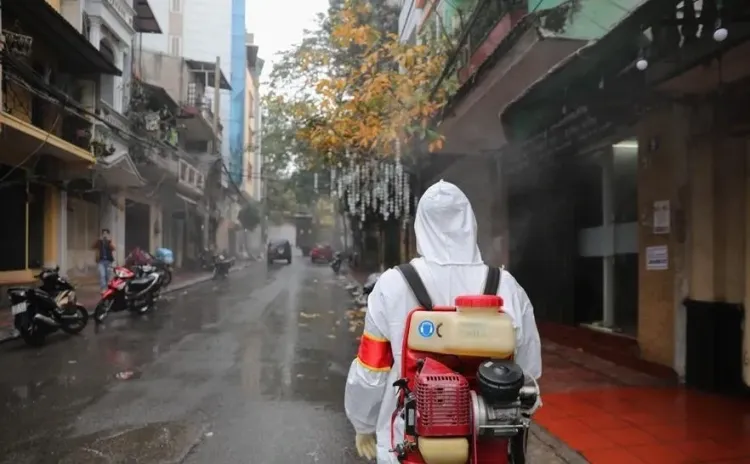Did Vietnam's capital report 150 new Covid-19 cases last week?

Synopsis
Key Takeaways
- Hanoi confirmed 150 new Covid-19 cases from May 30 to June 6.
- The city has recorded a total of 558 infections since the start of 2025.
- Authorities are increasing public health communication efforts.
- India is facing a resurgence with over 5,300 active cases.
- New variant NB.1.8.1 shows potential for increased transmissibility.
Hanoi, June 9 (NationPress) The Vietnamese capital, Hanoi, has reported 150 new Covid-19 infections from May 30 to June 6, showing a modest decline compared to the previous week, according to various reports.
Since the start of 2025, the city has seen a total of 558 cases, which is a reduction of 109 compared to the same timeframe last year, the report highlighted.
The Hanoi Centre for Disease Control is urging local authorities to enhance public education regarding Covid-19 and other seasonal illnesses, as reported by Xinhua news agency, referencing the Vietnam News Agency.
Meanwhile, in India, Covid cases are increasing again, with currently 5,364 active cases and four deaths reported in the last 24 hours.
Since January 1, over 4,700 recoveries have been recorded in India, alongside 55 reported deaths during the same period.
The recent surge is attributed to a new coronavirus variant known as NB.1.8.1, a subvariant of Omicron. This strain has been found in various countries, including the United Kingdom, the United States, Australia, Thailand, China, and Hong Kong.
First identified in January 2025, NB.1.8.1 is classified as a 'recombinant' variant, meaning it arose from the genetic mixing of two or more prior strains.
On May 23, 2025, the World Health Organisation (WHO) classified NB.1.8.1 as a 'Variant Under Monitoring' (VUM). According to WHO’s 2023 definition, a VUM is a variant that has experienced genetic alterations that might impact the virus’s traits. Preliminary data indicates that NB.1.8.1 may spread more readily or grow at a faster rate than other variants, although this remains unconfirmed.
The ramifications of NB.1.8.1 on health, immunity, and transmission are currently under examination. However, laboratory models suggest that this strain attaches more effectively to human cell receptors, indicating it could infect cells more proficiently than earlier variants.
Common symptoms linked to NB.1.8.1 include sore throat, cough, fever, muscle pain, and nasal congestion. Some patients have also reported gastrointestinal issues such as nausea and diarrhea.
Despite the emergence of this new variant, health specialists stress that vaccines continue to provide robust protection against infection, severe illness, hospitalization, and death.









